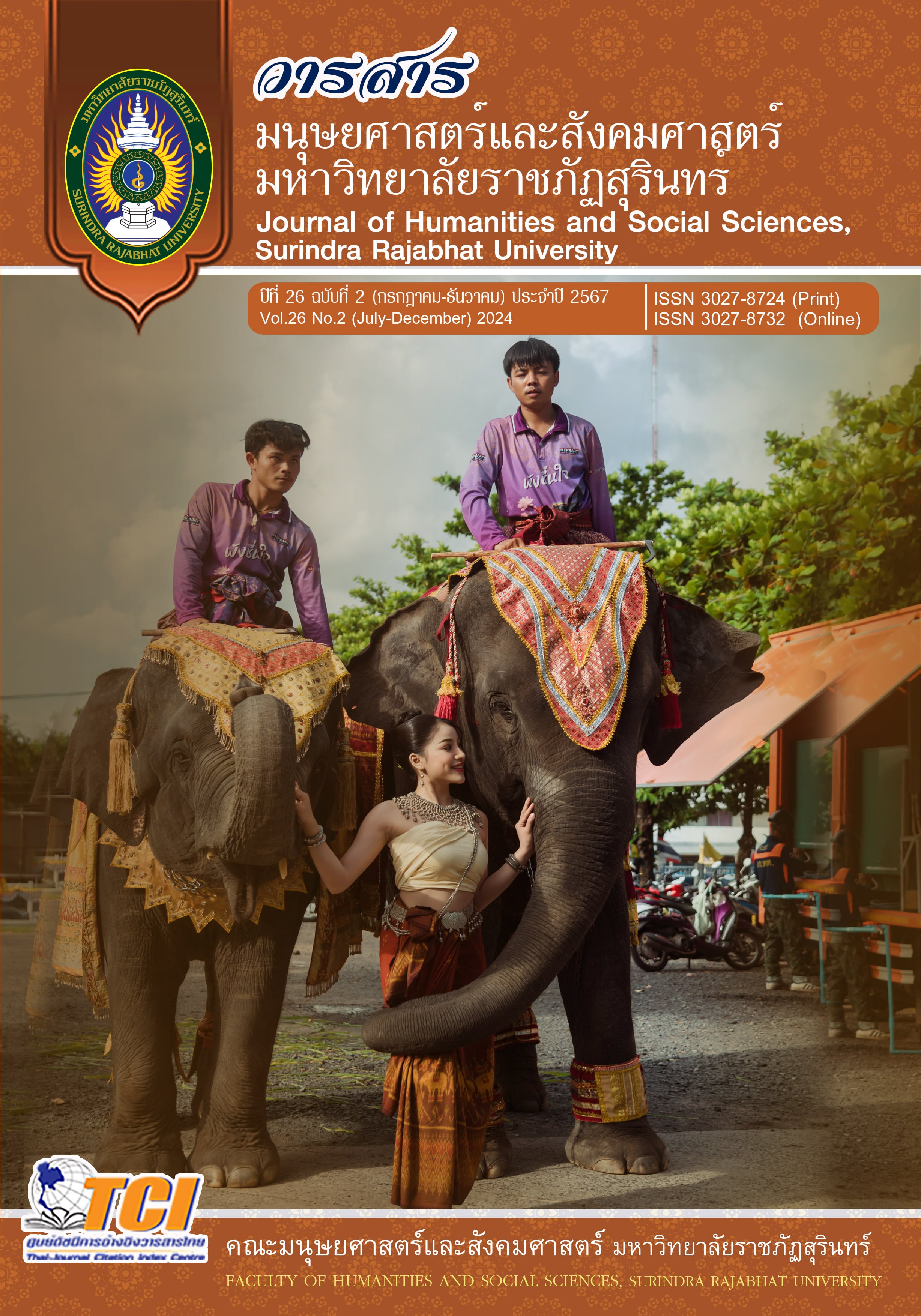Designing and developing of experiential learning package to promote Mathematics literacy for lower primary school students
Keywords:
Designing and developing of experiential learning package, Mathematical literacy, Experiential learning, Elementary education, Learning activity packageAbstract
This research aimed to 1) design and develop experiential learning activity sets to enhance mathematical literacy among early elementary students, and 2) examine the effectiveness of these experiential learning activity sets in promoting mathematical literacy among early elementary students. The sample group included 5 mathematics teachers under the Office of the Basic Education Commission in Mukdahan Province, 3 designers, and 98 lower primary school students, selected through multi-stage random sampling. Research tools include interview methods consisting of opportunity-based question sets, brainstorming methods, thought display forms, data synthesis forms, and concept model displays, experiential learning activity sets, and mathematics literacy tests for primary school students. The difficulty values of each test item range from 0.27 to 0.77, discrimination values range from 0.22 to 1.00, and the overall reliability of the test is 0.88. Reflective assessment forms were also used. Qualitative data analysis was conducted through content analysis and interpretation, while quantitative data analysis was performed using statistical software, employing mean, standard deviation, and percentage as the research statistics.
The research findings revealed that the development of design principles with essential characteristics for prototyping experiential learning activity sets aimed at promoting mathematical literacy among primary school students was successful. The components of these experiential learning activity sets included experiential learning plans, the roles of teachers, the roles of students, the organization of teaching and learning activities, and student assignments and projects. The test results showed that the activity sets were of good to excellent quality. Interviews with teachers indicated that the activity sets increased students' interest and enjoyment in learning, particularly when activities that were engaging and age-appropriate were used. Students found the lesson content easier to understand and could absorb knowledge more effectively, demonstrating greater readiness for learning. Evaluation and reflection from real-world trials confirmed the success of the activity sets in promoting mathematical literacy among primary school students.
Downloads
References
ชรินรัตน์ ด้วงธรรม และวนินทร พูนไพบูลย์พิพัฒน์. (2565). “การพัฒนาความฉลาดรู้ด้านคณิตศาสตร์ด้วยการจัดการเรียนรู้ออนไลน์ ตามกระบวนการคิดให้เป็นคณิตศาสตร์ เรื่อง ความน่าจะเป็นของนักเรียนชั้นมัธยมศึกษาปีที่ 5.” Journal of Roi Kaensarn Academi. 7(11) : 372–89.
สำนักงานเขตพื้นที่การศึกษาประถมศึกษามุกดาหาร. (2565). ผลการประเมิน (NT) ชั้นประถมศึกษาปีที่ 3. [ออนไลน์]. เข้าถึงได้จาก : https://mdh.go.th/ สืบค้น 25 พฤษภาคม 2566.
สุธารัตน์ บุญเลิศ และธัญญา กาศรุณ. (2566). “การพัฒนางานทางคณิตศาสตร์ที่สอดคล้องกับกรอบการประเมินของ PISA เพื่อส่งเสริมความฉลาดรู้ด้านคณิตศาสตร์ของนักเรียน.” Journal of Roi Kaensarn Academi. 8(6) : 381–92.
สมชาย โพธิจาทุม. (2564). การศึกษาความฉลาดรู้ด้านคณิตศาสตร์เรื่องปริมาณปริภูมิและรูปทรงของนักเรียนชั้นประถมศึกษาปีที่ 6 ที่ได้รับการจัดการเรียนรู้ตามกระบวนการคิดให้เป็นคณิตศาสตร์. วิทยานิพนธ์ปริญญาการศึกษามหาบัณฑิต สาขาวิชาคณิตศาสตร์ บัณฑิตวิทยาลัย มหาวิทยาลัยศรีนครินทรวิโรฒ.
อภิสิทธิ์ ไล่ศัตรูไกล. (2557). คู่มือการออกแบบบริการ = SERVICE DESIGN WORKBOOK. กรุงเทพฯ : ศูนย์สร้างสรรค์งานออกแบบ (TCDC).
Chan, C. K. Y. (2023). Assessment for experiential learning. Taylor & Francis.
Genc, M., & Erbas, A. K. (2019). “Secondary Mathematics Teachers' Conceptions of Mathematical Literacy.” International Journal of Education in Mathematics, Science and Technology. 7(3) : 222-237.
Hardianti, S., & Zulkardi, Z. (2019, October). “Students mathematical literacy abilities in solving PISA type math problem with LRT context.” Journal of Physic s : Conference Series.” 1315(1) : 012016.
Kolb, D. A. (2014). Experiential learning : Experience as the source of learning and development. United Kingdom : Pearson Education.
Rahmawati, W. A., Usodo, B., & Fitriana, D. L. (2021). “Mathematical Literacy Skills Students of the Junior High School in Solving PISA-Like Mathematical Problems. IOP Conference Series : Earth and Environmental Science. ” Journal of Physics: Conference Series (JPCS). 1808(1): 1-10.
OECD. (2018). “PISA 2022 Mathematics Framework (draft).” [Online}. Available : https://pisa2022-maths.oecd.org Retrieved August 4, 2021.
Utari, T. S. G., Kartasasmita, B. G., & Julika, C. (2019). “The application of situation-based learning strategy to improve literacy skills, mathematical problem-solving ability and mathematical self-efficacy at senior high school students.” International Journal of Innovation, Creativity and Change. 6(1) : 89-102.











